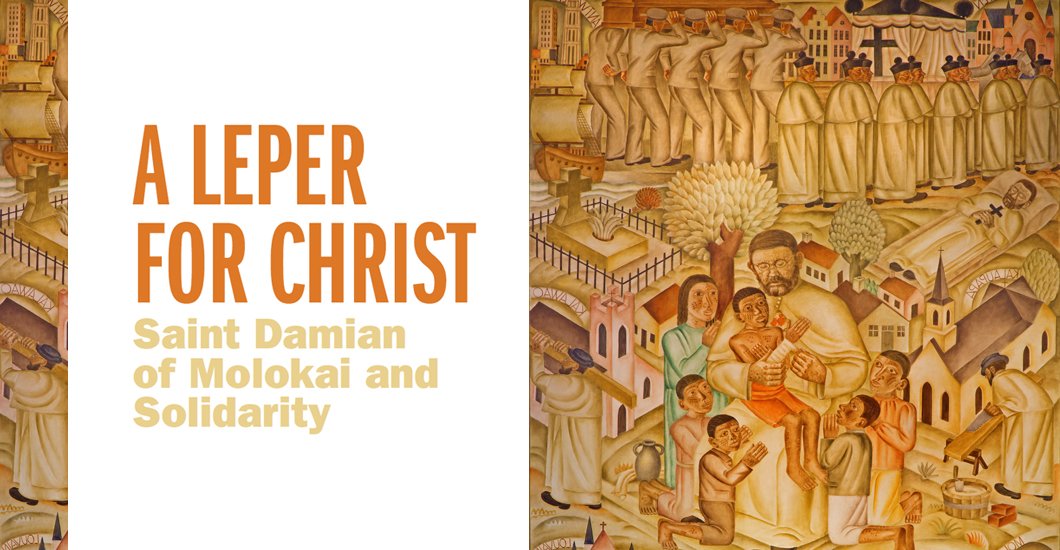Evangelize
A Leper for Christ: Saint Damian of Molokai and Solidarity
When Damien de Veuster arrived in Hawaii in 1864, he found an island-community beset by infections. Over the years, travelers and seamen had introduced diseases like influenza and syphilis. Yet none were as bad as Hansen’s Disease, more commonly known as leprosy. First reported in Hawaii in 1840, leprosy devastated people in many ways. First, because the disease was highly contagious and untreatable until the 1930s, people contracting it had no hope of recovery. This often led to deep depression among its sufferers. Second, leprosy caused a progressive degeneration of their skin, eyes, and limbs. It thus disfigured people and eventually immobilized them. Finally, few diseases isolated people from their communities as much as leprosy. Sufferers were seen as outcasts and cautioned to stay away from everyone else.
In 1866, to curb the spread of the disease, Hawaiian authorities decided to consign lepers to an isolated community on the island of Molokai. On three sides, the colony, called Kalaupapa, bordered the Pacific Ocean, and the fourth side featured massive, 1,600-foot cliffs. Once the lepers were out of sight and no longer a threat to the general population, the government turned a blind eye to their basic needs. Shipments of food and supplies slowed down, and the government removed most of its personnel. The result was a highly dysfunctional community marked by poverty, alcoholism, violence, and promiscuity.
Puritan missionaries became convinced that leprosy stemmed from the people’s licentiousness. But Damien knew that was not true. He believed the people on Molokai were basically good, not corrupt, and that sin did not cause the spread of the disease.
In time, Damien came to see the neglected colony as the answer to his boyhood longings for adventurous missionary work. He asked the local bishop for permission to go to Molokai, and the bishop not only granted approval, but personally accompanied Damien to the island. He introduced Damien to the 816 community members as “one who will be a father to you and who loves you so much that he does not hesitate to become one of you, to live and die with you.”
This introduction did not surprise Damien, who had no illusions about what his mission would entail. He knew working in the disease-ridden colony virtually guaranteed that he would become infected too. Yet he never wavered in his commitment.
At first, the conditions around the lepers proved overwhelming. Damien often felt as if he had opened a door to hell. Victims wandered about, their bodies in ruin and their constant coughing the island’s most familiar sound. Damien could hardly bear the stench:
“Many a time in fulfilling my priestly duties at the lepers’ homes, I have been obliged, not only to close my nostrils, but to remain outside to breathe fresh air. To counteract the bad smell, I got myself accustomed to the use of tobacco. The smell of the pipe preserved me somewhat from carrying in my clothes the obnoxious odor of our lepers.”
Eventually Damien overcame the distressing sights and smells. His superiors had given him strict advice: “Do not touch them. Do not allow them to touch you. Do not eat with them.” But Damien made the decision to transcend his fear of contagion and enter into solidarity with the Molokai lepers. He committed to visit every leper on the island and to inquire of their needs.
One early realization was that to show the lepers the value of their lives, he had to first demonstrate the value of their deaths. So he built a fence around the local cemetery, which pigs and dogs regularly scavenged. He also constructed coffins and dug graves, committing that each leper, even if marginalized throughout his life, would receive a decent burial upon death. This had a remarkably uplifting effect on the community.
Damien also devoted his attention to the sick. He brought the sacraments to bedridden lepers. He washed their bodies and bandaged their wounds. He tidied their rooms and did all he could to make them as comfortable as possible.
What surprised the lepers most was that Damien touched them. Other missionaries and doctors shrank from the lepers. In fact, one local doctor only changed bandages with his cane. But Damien not only touched the lepers, he also embraced them, he dined with them, he put his thumb on their forehead to anoint them, and he placed the Eucharist on their tongues. All of these actions spoke volumes to the dejected lepers. They showed that Damien did not want to serve them from afar; he wanted to become one of them.
Damien was careful never to present himself as a messianic figure, soaring in from a higher, more privileged position. He invited lepers to join in the work, turning his service to the community into an act of solidarity. He had them help build everything from coffins to cottages. When the colony expanded along the island’s peninsula, his leper friends helped construct a new road. Under his supervision, the lepers even blasted away rocks on the shoreline to create a new docking facility. Damien also taught the lepers to farm, raise animals, play musical instruments, and sing. Although the lepers were used to being patronized or bullied, Damien spread among them a new cheer and sense of worth.
This refreshing spirit impressed visitors to the island. “I had gone to Molokai expecting to find it scarcely less dreadful than hell itself,” wrote Englishman Edward Clifford in 1888, “and the cheerful people, the lovely landscapes, and comparatively painless life were all surprises. These poor people seemed singularly happy.”
Despite the idyllic community Damien had built through a decade of work, the moment he feared finally arrived in December 1884. One day, while soaking his feet in extremely hot water, Damien experienced no sensation of heat or pain—a tell-tale sign that he had contracted leprosy. The disease quickly developed, causing Damien to write to his bishop with the news: “Its marks are seen on my left cheek and ear, and my eyebrows are beginning to fall. I shall soon be completely disfigured. I have no doubt whatever of the nature of my illness, but I am calm and resigned and very happy in the midst of my people. The good God knows what is best for my sanctification. I daily repeat from my heart, ‘Thy will be done.’”
Soon, he also wrote home to his brother: “I make myself a leper with the lepers to gain all to Jesus Christ.”
Even before contracting the disease, Damien spoke of himself and the people of Molokai as “we lepers.” He identified closely with those he came to serve and thus, before and after the disease, offered a powerful, concrete expression of solidarity. And it was for that reason he become known not by his homeland, but by the island community he served—Saint Damien of Molokai, patron of lepers.
Brandon Vogt is a bestselling author and works as the Senior Content Director for Bishop Robert Barron’s Word on Fire Catholic Ministries. Reprinted with permission from StrangeNotions.com
Related Articles
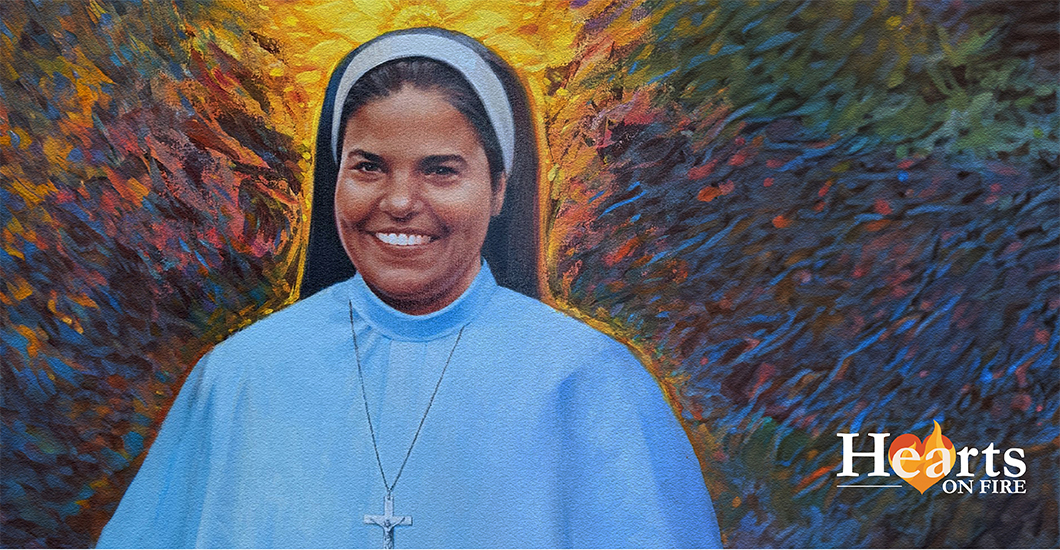
Jun 27, 2024
Enjoy
Jun 27, 2024
Rani Maria Vattalil was born on 29 January 1954 to Eleeswa and Paily Vattalil in a small village called Pulluvazhy, in Kerala, India. From a young age, she was brought up in the Christian faith, having love for the poor. She attended daily Mass and led family prayers. During the final year of high school, Rani felt the Lord calling her to consecrated life and entered the Franciscan Clarist Congregation in 1972. It was Rani Maria’s ardent desire to do missionary work in North India and serve the poor, even if it cost her life. She was sent to Madhya Pradesh (a central Indian state) and served several mission areas there.
Sister Rani Maria was given the responsibility of coordinating the social apostolate of the local diocese. She organized various educational programs for children and young people and worked relentlessly to empower the indigenous people. She understood how the poor, illiterate farmers were exploited and taken advantage of by their landlords. So, she educated them on their rights, helped them fight for justice, and spoke for those who were unjustly imprisoned. All this infuriated the upperclass landlords, who threatened her with dire consequences if she continued supporting the cause of the poor. But Rani Maria feared nothing and did not back down from her mission to 'love her neighbor.' A devious plan was then hatched by those who hated her.
On 25th February 1995, while traveling by bus, she was mercilessly stabbed 54 times by Samundhar Singh—a man hired by the landlords. She breathed her last, repeating the Holy name of Jesus. Rani Maria worked her entire life to fight for the dignity and rights of her fellow men and bore witness to the Gospel through her social activities. Sister Rani Maria’s family, following the valiant example of their daughter, forgave her murderer wholeheartedly, even inviting him to their home! This act of mercy touched him deeply; he repented of his heinous crime and became a changed man.
Sister Rani Maria was beatified by Pope Francis on 4th November 2017.
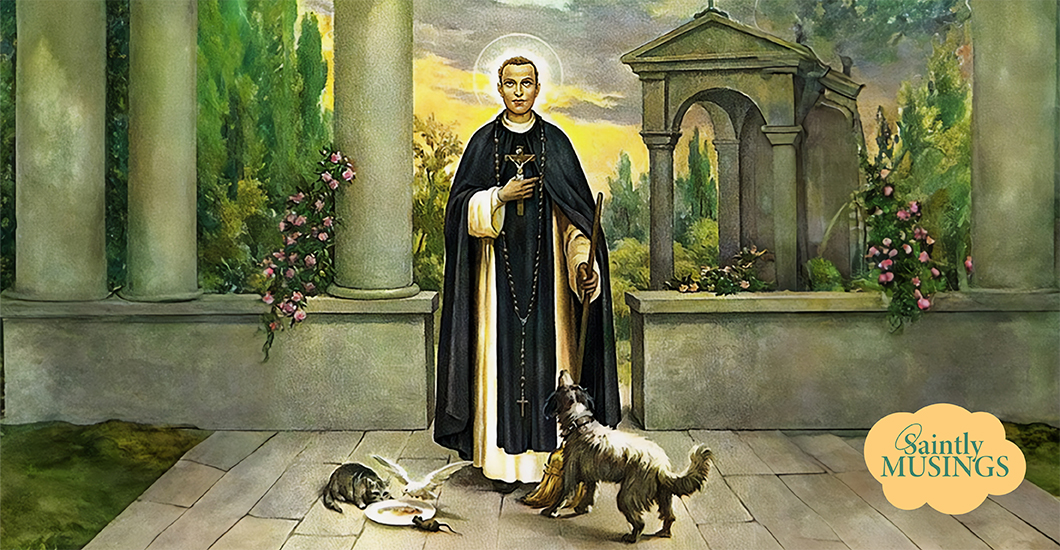
Apr 29, 2024
Encounter
Apr 29, 2024
Martin de Porres was born in 16th-century Peru; he grew up facing the stigmas of both his mixed race and illegitimacy. After a barber-medical apprenticeship in his young years, he joined the Dominicans as a ‘lay helper’ and continued his barber work in the monastery.
One day, Brother Francis Velasco Carabantes approached Martin, desiring to talk to this man whom people were already starting to believe was saintly. Martin was busy with his barber work; he absent-mindedly grabbed this novice and placed him in the barber’s chair. Brother Francis had no inclination to have his head shaved; he disliked the hairstyle that the Dominicans used.
Before he could resist, Martin had finished his job, and Brother Francis was angry beyond expression. He started to shout, calling Martin all sorts of curse words. Martin was lost in prayer, and by the time he noticed that this novice was shouting, one of the rectors had seen the commotion and was scolding Brother Francis, who was severely punished and sent away.
Martin, once he came to realize what had happened, went to the rector with all possible excuses. He begged forgiveness for this person who had verbally abused him, trying even to explain away the curse words used. Finally, he told the rector: “Everyone knows what a sinner I am.” The rector, who was aware of Martin’s saintly life, gave in to his request and forgave Brother Francis. Not satisfied with this, Brother Martin even sent fresh fruit, which was a rare delicacy in the monastery, to Brother Francis.
How many times have we rejoiced in the ‘just’ punishments that our transgressors received? Let us pray to Saint Martin for the virtue of humility, to forgive and show the other cheek, as Jesus taught us to do.

Dec 12, 2023
Encounter
Dec 12, 2023
On a scorching afternoon on the streets of Calcutta, I met a boy…
Prayer is an undeniable, central, and key part of every Christian’s life. However, Jesus emphasized two more things which clearly went hand in hand with prayer—fasting and almsgiving (Matthew 6:1-21). During the seasons of Lent and Advent, we are specifically called to commit more time and effort to all three ascetic practices. ‘More’ is the important word. Whatever season we are in, radical self-denial and giving are a continuous call for each baptized believer. Around eight years ago, God literally made me stop and think about it.
Unexpected Meeting
In 2015, I had the great privilege and blessing of fulfilling a lifelong dream to be with and serve some of the most in-need brothers and sisters worldwide in Calcutta, India, where the poor are described not only as poor but the ‘poorest of the poor.’ From the moment I landed, it was as though electricity was running through my veins. I felt such immense gratitude and love in my heart to be given this amazing opportunity to serve God with Saint Mother Teresa’s religious order, the Missionaries of Charity. The days were long but absolutely action-packed and grace-filled. Whilst I was there, I did not intend to waste a moment. After a 5 AM start to each day with an hour of prayer, followed by Holy Mass and breakfast, we set off to serve at a home for the sick, destitute, and dying adults. During the break at lunchtime, after a light meal, many of the religious brothers I was staying with took a siesta to recharge their batteries, to be ready to go again in the afternoon and on into the evening.
One day, instead of having a rest in the house, I decided to go for a walk to find a local internet café, to contact my family by email. As I turned one of the corners, I encountered a young boy aged around seven or eight years old. His face expressed a mixture of frustration, anger, sadness, hurt, and tiredness. Life had already seemed to have begun to take its toll on him. He was carrying over his shoulder the biggest transparent, heavy-duty plastic bag that I had seen in my life. It contained plastic bottles and other plastic items, and it was full.
My heart broke within me as we stood silently examining one another. My thoughts then went to what I could give this young boy. My heart sank, as I reached for my pocket, realizing that I only had a small amount of change with me to use for the internet. It added up to less than one pound in English money. As I gave it to him, looking him in the eye, his whole being seemed to change. He was so lifted and grateful, as his beautiful smile lit up his beautiful face. We shook hands, and he walked on. As I remained standing in that back street of Calcutta, I stood in awe as I knew that the Almighty God had just personally taught me such a powerful life-changing lesson through this encounter.
Reaping Blessings
I felt God had beautifully taught me in that moment that it is not the actual gift that is important but the disposition, intention, and love from the heart with which a gift is given. Saint Mother Teresa beautifully summed this up saying, “We cannot all do great things, but we can do small things with great love.” Indeed, Saint Paul said, if we give away all we have “but have not love,” we gain nothing (1 Corinthians 13:3).
Jesus describes the beauty of giving, that when we “give… it will be given to you; good measure, pressed down, shaken together, running over, will be put into your lap. For the measure you give will be the measure you get back.” (Luke 6:38). Saint Paul also reminds us that “Whatever a man sows, that he will also reap” (Gal 6:7). We do not give in order to receive, but God in His infinite wisdom and goodness blesses us personally in this life and also in the next when we step out in love (John 4:34-38). As Jesus taught us, “it is more blessed to give than to receive” (Acts 20:35).
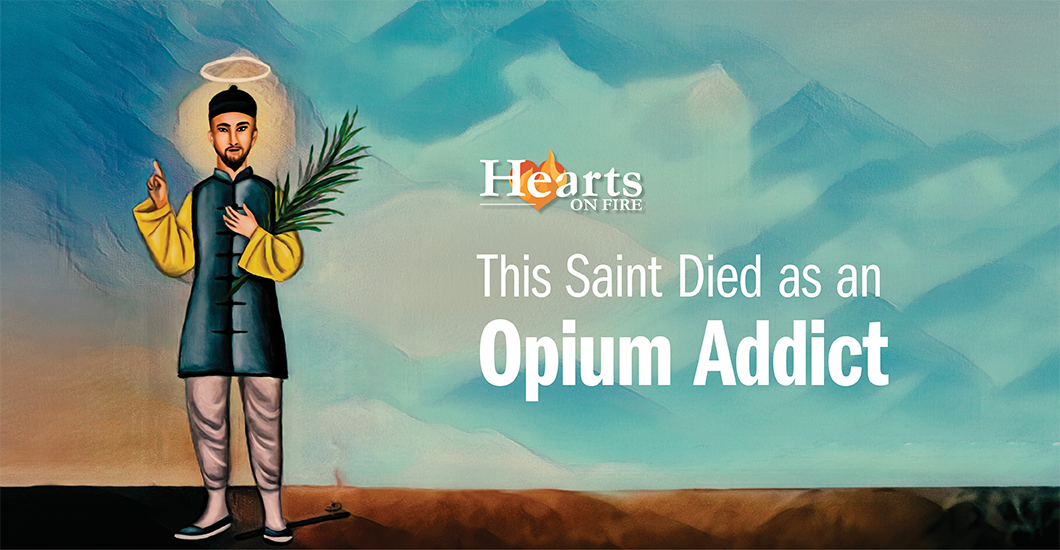
Nov 01, 2023
Engage
Nov 01, 2023
The Chinese Boxer Rebellion in the 1900s killed nearly 32,000 Chinese Christians and 200 Western Missionaries. Among these devoted Christians who gave their life for their faith, Saint Mark Ji Tianxiang stands out because, at the time of his death, he was an opium addict who had not received the Sacraments for 30 long years.
Ji was raised in a devout Christian family, and he was a respected and charitable doctor in his community. Fate be blamed, the opium he took to abate a disturbing stomach ailment took hold over him, and he was addicted to it in no time.
Though he went to frequent Confession, Ji found himself in the grips of a powerful addiction that refused to succumb to any means of resistance. His parish priest and confessor eventually told him that he could not continue to repeat the same sin in Confession anymore. Confession requires a conscious resolve to repent and sin no more, and this repeated sin, in the 19th century, was not understood as an illness. He was henceforth restricted from receiving the Sacraments, but he continued visiting the Church and stayed true to the Lord’s ways. He remained sincere to his faith because He believed in a Merciful Father.
Many assumed that he would be the first to deny the Lord when faced with the threat of persecution. But along with his son, grandchildren, and daughters-in-law, he persevered till the very end. In fact, Ji provided spiritual consolation to his fellow Christians as they were imprisoned and awaiting execution.
Stories record that as they were dragged to prison, his grandson, shaking with fear, asked him, “Grandpa, where are we going?” He calmly and jubilantly answered: “We’re going home.” He went to his death, singing the Litany of the Blessed Virgin Mary. Pope John Paul II canonized him in the year 2000.
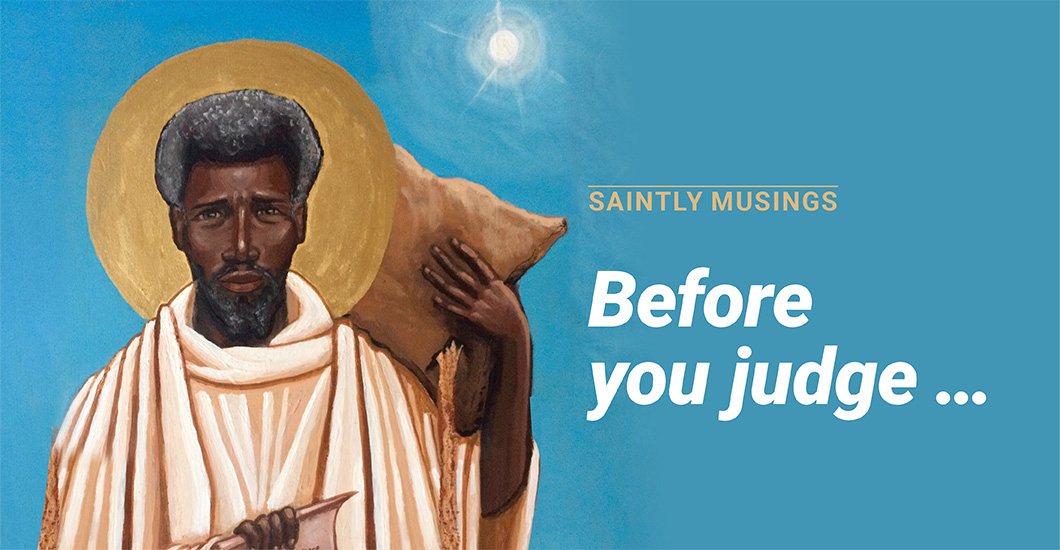
May 31, 2023
Engage
May 31, 2023
Ever heard of a robber who turned into a Saint? Moses the Black was a leader of a band of thieves who attacked, robbed, and murdered travelers in the Egyptian desert. The very mention of his name spread terror in people’s hearts. On one occasion, Moses had to hide in a monastery and was so amazed at the way he was treated by the Monks that he converted and became a monk! But the story doesn’t end there.
Once, four of the robbers of his former band descended upon the cell of Moses. He had lost none of his great physical strength, so he tied them all up. Throwing them over his shoulder, he brought them to the monastery, where he asked the Elders what to do with them. The Elders ordered that they be set free. The robbers, learning that they had chanced upon their former ringleader and that he had dealt kindly with them, followed his example: they repented and became monks. Later, when the rest of the band of robbers heard about the repentance of Moses, they also gave up their thievery and became fervent monks.
After many years of monastic struggles, Moses was ordained deacon. For another fifteen years, he continued his monastic labors. About 75 disciples gathered around the saintly Elder, who had been granted the gifts of wisdom, foresight, and power over demons by the Lord.
Once, a certain brother committed an offense in Scete, the camp of the monks. When a congregation was assembled to decide on this matter, they sent for Abba Moses, but he refused to come. Then they sent the priest of the church to him, imploring, “Come, for all the people are expecting you,” and finally, he responded to their pleas.
Taking a basket with a hole in it, he filled it with sand and carried it upon his shoulders. Those who went out to meet him asked, “What does this mean, O Father?” And he replied, “The sands are my sins, which are running down behind me, and I cannot see them. Yet, I have come here today to judge shortcomings that are not mine.” When they heard this, they set that brother free and said nothing further to him.
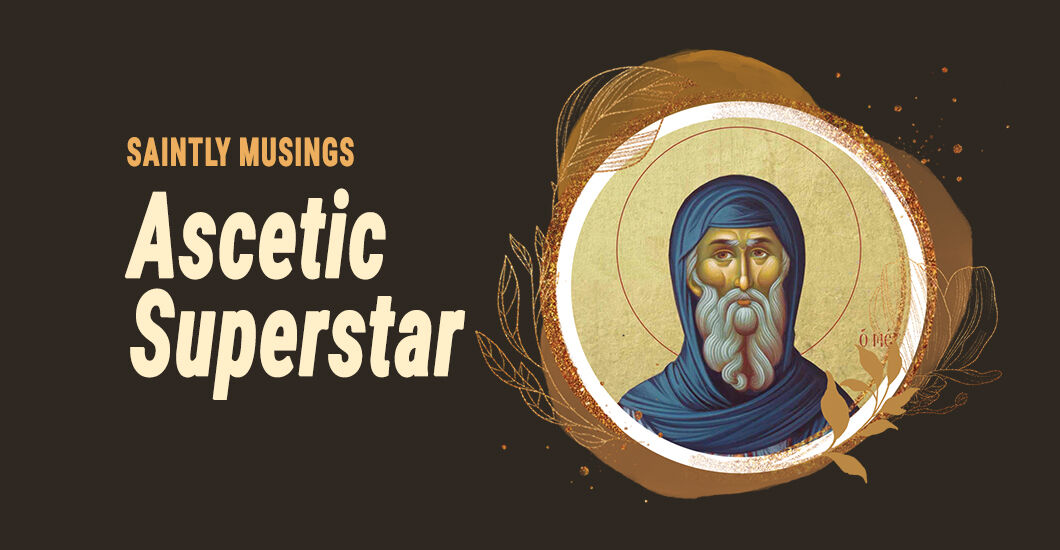
Mar 01, 2023
Engage
Mar 01, 2023
At the age of 20, Anthony lost his parents and was left with a large inheritance and the responsibility of caring for his sister. About the same time, Anthony happened to hear a reading from the Gospel of Matthew, where Jesus tells a rich young man, "If you want to be perfect, go and sell everything you have and give the money to the poor." Anthony believed he was that rich young man. Shortly after, he gave away most of his property, sold almost everything else, and kept only what he needed to care for himself and his sister. But that’s not exactly what the Lord had commanded!
Not long afterward, Anthony was at Mass once again and heard the Gospel passage, “Do not worry about tomorrow; tomorrow will take care of itself” (Matthew 6:34). Again, he knew Jesus was speaking directly to him, so he gave away even the little he had saved, entrusted his sister to the care of some holy women, and entered the desert to live a life of poverty, solitude, prayer, and mortification.
In that harsh desert landscape, the devil attacked him in countless ways saying “Think about all the good you could have done with that money you gave away!” Firm in prayer and mortification, Anthony fought off the devil and his manifestations. Many were attracted to his wisdom, and these he encouraged to seek self-denial and the hermetic life. No wonder after his death he became Saint Anthony the Great or Saint Anthony of the Desert, the father of Christian Monasticism.
Once a brother renounced the world and gave his goods to the poor, but he kept back a little for his personal expenses. He went to see Abba Antony. When he told him this, the old man said to him, "If you want to be a monk, go into the village, buy some meat, cover your naked body with it and come here like that." The brother did so, and the dogs and birds tore at his flesh. When he came back the old man asked him whether he had followed his advice. He showed him his wounded body, and Saint Antony said, "Those who renounce the world but want to keep something for themselves are torn in this way by the demons who make war on them."
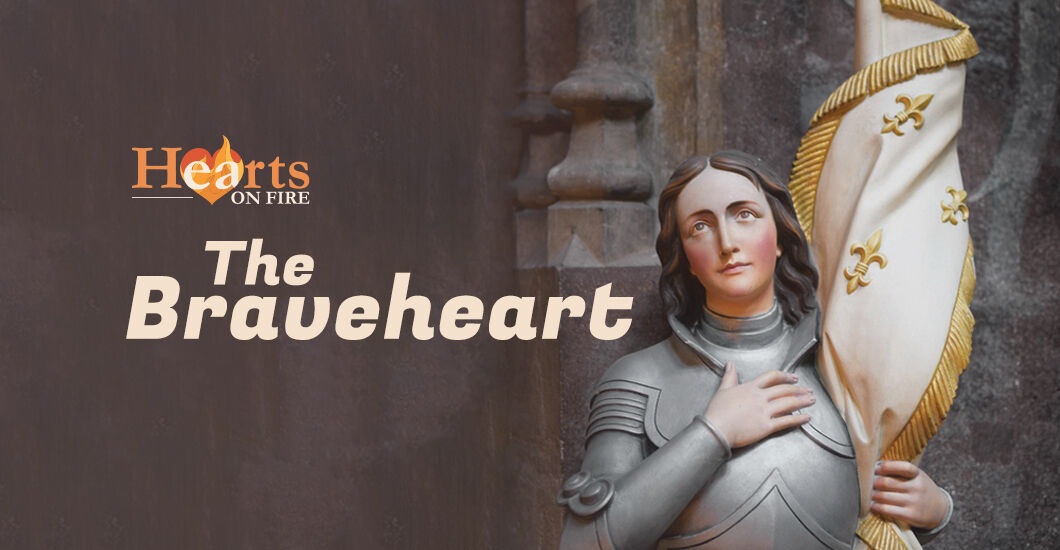
Jan 14, 2023
Engage
Jan 14, 2023
Few Saints of the Catholic Church have captured the popular imagination like Joan of Arc. Her story is depicted in paintings, sculptures, and numerous films.
Born into a peasant family in 1412, Joan grew up illiterate, but acquired a profound love for the Church and a deep faith in God from her mother. Because she loved prayer and the sacraments, her neighbors said, “She was so good that all the village loved her.” She cared for the sick and homeless, often even giving them her own bed.
By the age of thirteen, Joan began to hear the voices of Michael the Archangel, Saint Margaret of Antioch, and Saint Catherine of Alexandria. They told her she was to liberate France and ensure the French heir to the throne was installed as France’s rightful king. She won his trust by telling him details of his past only someone with divine knowledge could know. At the time, France was dominated and ruled by England.
Convinced that her “voices” came from God, Joan heroically and faithfully obeyed their instruction, despite obstacles and suffering. Prayer and contemplation remained primary in her life even as she led battles, during which she never raised the sword against an enemy
Though two years earlier a commission had “declared her to be of irreproachable life, a good Christian, possessed of the virtues of humility, honesty and simplicity”, Joan was accused of witchcraft and heresy after the English captured her, receiving no support from the very King she put on the throne. At her trial, Joan manifested her deep faith and wisdom, and despite being wrongly condemned, she never lost her faith in God or the Church. When she was burned at the stake, she proclaimed the name of Jesus while holding a crucifix to her heart, causing an observer to say, “We have burned a saint.”
Her death increased her fame and popularity. Twenty years later, a new trial declared her innocent of all her alleged crimes. After her reputation grew over the centuries to epic proportions, Joan was beatified in 1910 by Pope Pius X and canonized eleven years later by Pope Benedict XV. She is now the patron Saint of France and one of the Church’s most beloved Saints.
Joan’s obedience to God ensured France kept the Catholic faith during the Protestant Reformation while England abandoned it. France remained a solid center of Catholicism from which it would spread to northern Europe.
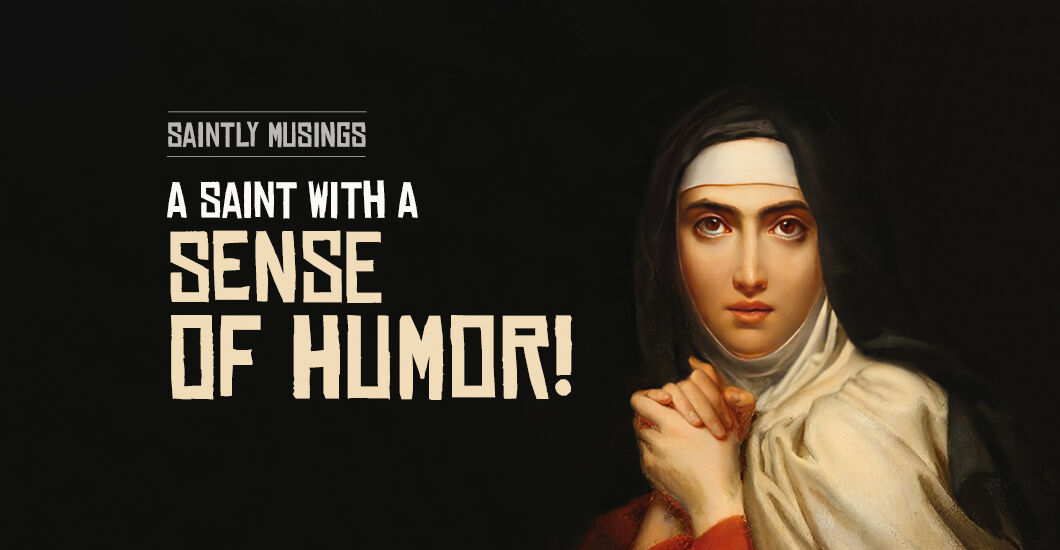
Jan 03, 2023
Engage
Jan 03, 2023
The river had swelled so high that water covered everything and all sense of where the road or footpath might be was purely a guess. With water everywhere, it seemed foolish to advance, especially in a carriage, for if anyone strayed ever so little off the road, they would perish without a doubt.
As her companions panicked, Sister Teresa encouraged them, “As we are engaged in God’s work, how could we die in a better cause?” She then led the way on foot to the convent through the fierce storm. Suddenly she slipped down an embankment and fell squarely into the mud.
Instead of complaining or cursing, the irrepressible nun, looked to the sky and quipped, “If this is how you treat your friends, no wonder you don’t have many!” The sixteenth-century Saint and Doctor of the Church, Teresa of Avila, didn’t take herself or this world too seriously and brushed off the little hardships of life with a sense of humor.
Her ability to humbly recognize her own faults and need for grace was also tinged with her refreshing humor. In her autobiography, Teresa writes, “Having virtuous and God-fearing parents would have been enough for me to be good if I were not so wicked.” Saint Teresa was also mindful of false piety and once said, “From silly devotions and sour-faced saints, good Lord, deliver us!”
A healthy and good sense of humor will keep our head straight and enable us to see the world’s true beauty. Did God say that we need to be “sour-faced” to be holy? So, if you want to become a saint, lighten up, share the joy of the Lord and laugh with your friends like Jesus did.
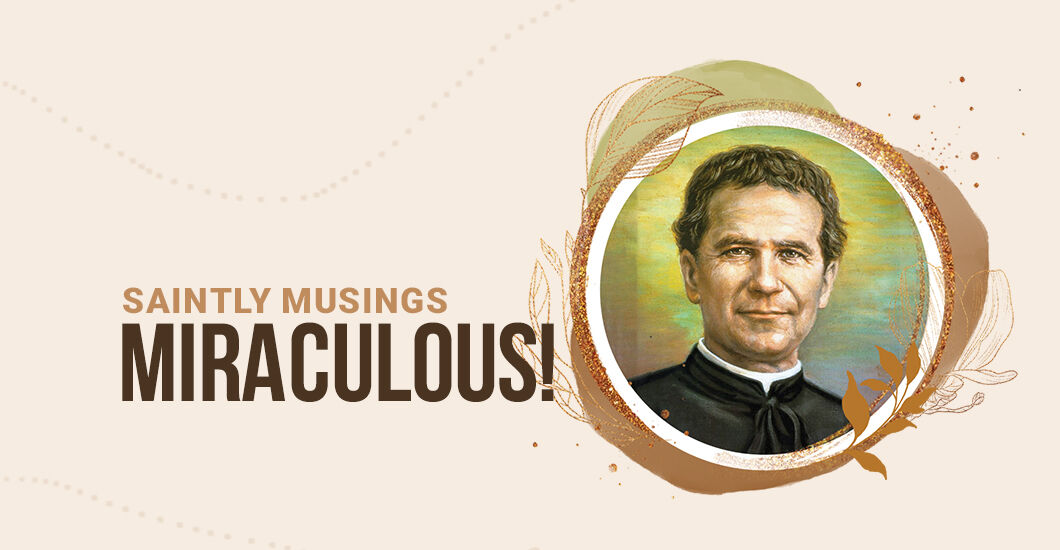
Nov 01, 2022
Enjoy
Nov 01, 2022
Maria Stardero, a 12-year-old girl, was led by her aunt into the church where dozens of boys were standing about or kneeling in prayer as they waited for Don Bosco to arrive for confessions. As she made her way to a pew, some of the boys noticed that the young girl’s eyes had no corneas and resembled white marbles.
When Don Bosco arrived, he asked the girl about her condition. She had not been born blind, she told him, but because of eye disease she had completely lost her sight two years earlier. When he inquired about medical treatment, her aunt began to sob. They had tried everything, but doctors had only one thing to say: “It is incurable!”
“Can you tell whether things are big or small?” Don Bosco asked the child.
“I can’t see anything.”
He led her to a window to see if she could perceive light, but she couldn’t.
“Would you like to see?” Don Bosco asked.
“Oh, yes! It’s the only thing I want,” said the girl, breaking down in tears.
“Will you use your eyes for the good of your soul and not to offend God?”
“I promise I will, with all my heart!”
“Good,” said Don Bosco. “You will regain your sight.”
After recourse to Mary, Help of Christians, Don Bosco recited the Hail Mary and blessed the girl. Then holding a medal of Mary Help of Christians before the girl’s eyes he asked, “For the glory of God and the Blessed Virgin, tell me what I’m holding in my hand.”
“She can’t . . .” the elderly aunt began, but Don Bosco paid no heed. After a few seconds, the child shouted, “I see!” Immediately she described the medal in great detail. But when she stretched out her hand to receive it, it rolled into a dark corner.
The aunt moved to retrieve it, but Don Bosco motioned her back.
“Let her find it to see if the Blessed Virgin has thoroughly restored her sight,” he insisted. Immediately, the girl walked to the dark corner and bent down to retrieve the tiny object. As the many witnesses looked on, awed and profoundly moved, Maria, thanked Don Bosco profusely and with sobs of great joy.
Entrust everything to Jesus in the Blessed Sacrament and to Mary, Help of Christians and you will see what miracles are! Saint John Bosco
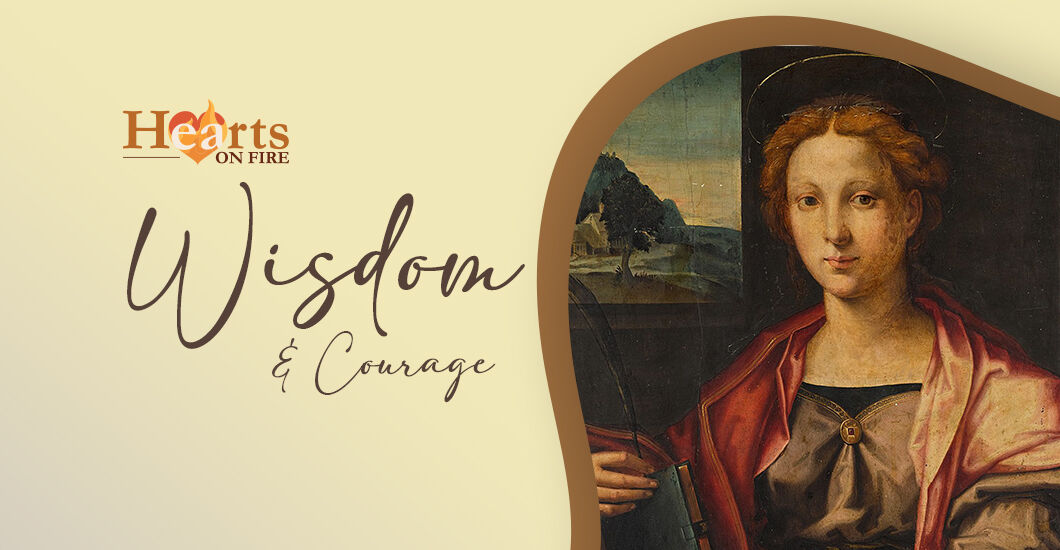
Nov 01, 2022
Engage
Nov 01, 2022
Venerated as one of the fourteen Holy Helpers (intercessors invoked especially against diseases) Saint Catherine of Alexandria is a virgin martyr of the late third century and early fourth centuries. Though there are no primary sources that attest to her life, there are many traditions about her kept alive over the centuries, including the fact that Joan of Arc claimed hers as one of the voices that spoke to her.
Born around 287 in Alexandria, Egypt, a cultural and educational center of the ancient world, she was of the noble class and a very gifted student. She embraced Christianity at age 14 after seeing a vision of Jesus and His blessed mother.
A precocious young woman, she didn’t hesitate at the age of 18 to challenge the emperor Maxentius when he began to cruelly persecute the Christian community. The emperor was so impressed by her wisdom that, rather than execute Catherine, he ordered her to debate his best philosophers, whom she easily bested. In fact, the philosophers were so taken by her wisdom, that they and some 200 soldiers embraced the faith. Sadly, all were immediately martyred.
Frustrated by Catherine’s amazing resilience, the emperor ordered that she be jailed and tortured. But even her brutal scourging did not cause Catherine to give up her faith. So, the emperor tried a novel approach: he offered to marry her and make her an empress. Already wedded to Christ and having dedicated her virginity to him, Catherine refused the emperor.
Enraged, the emperor ordered that she be executed on a spiked wheel, an especially brutal means of torture. But when Catherine touched the wheel, it miraculously shattered. Finally, the emperor commanded she be beheaded.
Especially popular during the medieval period, devotion to Catherine spread during the crusades and she has remained popular in both the Roman Catholic and Orthodox churches. Celebrated in much renaissance art, Catherine is the patroness of students and teachers, librarians, and lawyers. Her feast is celebrated on November 25.
May her courage and her wisdom in accepting death rather than abandoning her faith in Christ inspire us and give us hope.
Saint Catherine of Alexandria, pray for us.
